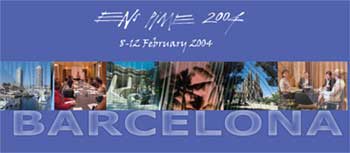
PIME 2004 sets an attendance record
ENS PIME 2004 – the latest in the annual
series of conferences for nuclear communicators – took place
in Barcelona on 8-12 February, and achieved record attendance,
with about 180 participants registering from some 30 countries.

This year, the main themes were nuclear and politics,
public opinion, public acceptance, strategy and messages, stakeholder
dialogue, nuclear safety, sustainable development and corporate
social responsibility, experiences of the Spanish nuclear sector,
media relations, crisis communications, communicating locally
and the future of nuclear.
At PIME 2003 in Malta, a new and highly successful
formula was introduced for the event – morning plenary sessions,
followed by afternoon workshops and round-tables. The same tried-and-tested
format was followed in Barcelona, giving ample opportunity for
‘PIMERs’ to exchange experiences and discuss possible
new strategies.
Opening the conference, ENS President Bertrand
Barré said resistance to nuclear in several countries could
not be underestimated. However, it was also true that in many
parts of the world, Europe included, nuclear's prospects were
either secure or on a pathway towards growth.
A keynote speech was delivered soon after the
start of the conference by the Vice President of the European
Parliament, Alejo Vidal-Quadras Roca, who called for greater political
leadership on energy issues.
He said: “It is clear that Europe must
take extremely important decisions in relation to energy policy
in a very short time... Electricity production in nuclear fission
plants, which has always been a complex economic and technological
issue, has increasingly become a political one. And it is not
an exaggeration to say that nuclear energy still arises in some
European countries as one of the most emotional, bitter and polarised
political debates of today."
Concluding his presentation, Mr Vidal-Quadras
Roca stated: “It is obvious that in a future of energy shortages,
deep concerns about global warming and poor performance of renewables,
nuclear power will be seen with very different eyes... The unknowns
are too many, and the consequences of making the wrong forecast
will be too terrible. That is why decisions must be taken immediately,
and that means that the politicians of today have the obligation
to raise their vision and their leadership to face the challenges
of tomorrow."
There were also important contributions from
senior officials from the European Commission – Mr Michel
Poireau from the Directorate-General (DG) for Research and Mr
Derek Taylor from the DG for Energy and Transport (TREN). Other
highlights included presentations by Dr Peter Hählen (SVA,
Switzerland) on last year's Swiss referendum success and Patrice
Bernard (CEA) on new reactor types.
In his closing remarks, ENS’s secretary
general, Dr Peter Haug, urged all those involved in nuclear communication
to strip their main external messages of all complex formulations
and jargon – favouring brevity, simplicity and succinctness.
“Nuclear technology is indeed complex and difficult for
lay people to understand,” said Dr Haug. “It makes
no sense to reflect this complexity in our communication activities.”
On nuclear’s context in the broader concepts
of an ‘energy chain’ and the economy as a whole, Dr
Haug stressed that, to the outside world, nuclear should not be
promoted as being particularly special. Rather, it should be presented
as one of a range of options that must be used, in the interests
of a sustainable future for humanity.
Conceding that many people had still to be convinced
of this, Dr Haug relegated those against nuclear to “a twilight
world, where everything will come right if we build more wind
farms and use less energy”. “It is our task to show
that this view of the future is totally unrealistic,” he
added.
For the second year in succession, the IAEA committed
significant support to the event, sponsoring 20 participants,
staging a workshop and organising a short course on communication
techniques, which took take place straight after the PIME conference.
The final element of the PIME programme was a
technical tour to view the Vandellòs-1 nuclear plant site,
where decommissioning work has made excellent progress. The tour
also included a visit to a nearby training centre.
This year's PIME was sponsored by the Spanish
Nuclear Industry Forum and the Spanish Nuclear Society, as well
as FORATOM. The next PIME is due to be held in the Paris area
on 13-16 February 2005.
Virtually all the presentations given at the
event in Barcelona are available on the conference website: www.pime2004.org.
In addition, a free CD containing a wide range of computer files
related to the conference has been produced to give participants
a user-friendly record of the event for reference purposes.
|






